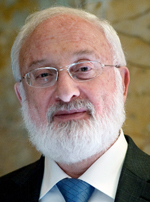Save Our Home: Planet Earth

PETACH TIKVAH, Israel — Entire neighborhoods are engulfed in fire; thousands have been evacuated from their homes in California. A historic and unusual summer thunderstorm and rare massive lightning strikes combined with record-breaking heat ignited devastating fires across the Golden State. Death Valley reported temperatures of 130°F in what is believed to be the highest temperature ever measured on Earth, and this is attributed to climate change. Other natural disasters around the globe endanger our very existence. What is nature trying to tell us? Its message is clear. We are unwanted guests on this planet unless we humans change.
Global warming not only causes blazes, agricultural problems, water shortages and puts certain species at risk of extinction; it is also blamed for glaciers melting away in Greenland and other locations to the point of no return, dangerously raising sea levels. It is said that there are actions we can take to tackle global warming, such as reducing gas emissions from the industrial sector, but there are so many economic and personal interests that very little is actually done.
If the ecosystem continues deteriorating at such a fast pace, half of humanity may become extinct, and the half that will survive will have to change its way of life from end to end. Continuing our “business as usual” approach despite Earth’s outcry is extremely dangerous.
Man is a very delicate creature. We need so many conditions to live and so many factors affect us: earthquakes, storms, plagues. The problems we face are global in scope; therefore, solutions require global thinking. Yes, thinking. Everything starts with our thoughts.
People think only of themselves, of what is bothering them today and what may produce big profits. Moreover, international organizations, which are supposed to safeguard our planet, fail the test over and over again. Every country is busy developing weapons and economic power, fighting others in all sorts of arenas and thinking that this is how control will be gained. If an ecological disaster does not affect us directly, we do not care.
We have not realized yet that our planet is our common home and whatever happens within it has an endless chain of reactions which will eventually affect us. Someday, we will have to understand that the problems begin with the selfish nature of man, who operates from an individualistic, me-centered, exploitative and narrow vision that wants to keep everything for himself. Until we transcend individual and national borders and start thinking globally, nothing will help.
Sometimes it’s the turn of certain countries to undergo natural disasters, and then it’s the turn of other countries. But overall, there will be no place on Earth that will not face problems. The coronavirus is the current global disaster, with many others waiting in the wings, if necessary. It is nature’s way of making us feel on our own skin that we are all part of one system.
Ecological calamities make people believe that nature has gone crazy. This is not the case. It simply behaves according to the laws of cause and effect of the integral system in which we live, a system that ties all the details of reality together. What happens inside the Earth, on its surface, and in the whole universe is linked and interconnected because nature is one.
Humans, for our part, need to comprehend that the state of nature depends on the relationships between human beings, and on the willingness of man to adapt to the integrality of nature—that is, taking only what is necessary for survival and caring for the good functioning of the entire system, instead of considering only egoistic calculations.
How are human relationships and what happens in nature related? There are four levels in nature: inanimate, vegetative, animate, and human. All but man exists in accordance with nature’s laws of reciprocity and balance. The other levels have no free choice in anything; they act instinctively taking only what is needed for their survival. Conversely, the human level is the only one that commits atrocities on Earth and does so intentionally, consciously, for the sake of causing harm. Thus, all the negative reactions we receive from nature are just a consequence of our actions. Simply put, we bring these blows upon ourselves.
As of today, humanity does not have an agreed-upon plan to save the planet, and we are just putting out fires instead. And the truth is that the most destructive fires we must put out are those burning within us, in our mutual relations. The ego of man has nearly reached the flash point burns nature just to exploit everything to his advantage.
If we try to build a harmonious system of human relations, all of nature will calm down. The comprehensive solution to the ecological and social dangers we face lies in efforts toward global connection in which we will feel how dependent we are on everyone. Therefore, we will think twice before engaging in ill-treatment of one another. Thus, only through mutual responsibility will we attain the right frame of mind to save our common home and live safely and happily under one roof: our planet.